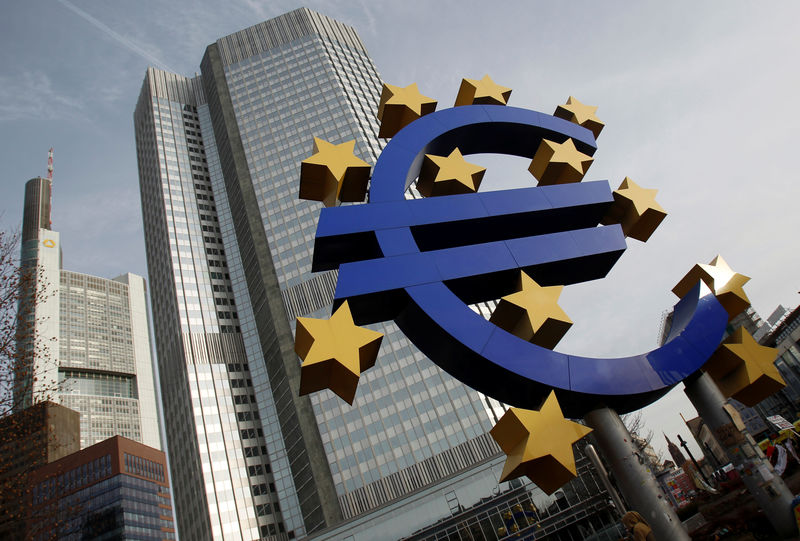 © Reuters. FILE PHOTO: A sculpture showing the Euro currency sign is seen in front of the ECB headquarters in Frankfurt
© Reuters. FILE PHOTO: A sculpture showing the Euro currency sign is seen in front of the ECB headquarters in FrankfurtFRANKFURT (Reuters) – Euro zone inflation could accelerate faster than earlier thought, the European Central Bank’s Survey of Professional Forecasters showed on Friday, underpinning the bank’s decision to slowly remove stimulus.
The ECB, which targets inflation at just below 2 percent, decided on Thursday to stay on course to end asset purchases this year and hike rates by late 2019. The bank is satisfied that a five-year growth run will push price growth higher but also has concerns that a global trade war could unravel the expansion.
Headline inflation is seen at 1.7 percent this year, above a previous projection for 1.5 percent, while next year’s rate is also seen at 1.7 percent, above the 1.6 percent projected three months ago, according to the survey of 56 forecasters, an important input in the ECB’s policy deliberations.
The figures also match the ECB’s own staff projections, which see inflation holding at 1.7 percent through 2020, a rate that is close to the bank’s target but still seen by ECB chief Mario Draghi as a miss.
By 2023, deemed ‘long term’ in the survey, the inflation rate is seen accelerating to 1.9 percent.
But most of the improvement in the forecasts was due to volatile food and energy prices as underlying inflation forecasts were unchanged in the survey.
With regard to growth, the survey sees a somewhat slower expansion in the near term than projected three months ago, but long-term expectations remained unchanged.
For this year, the growth projection was cut to 2.2 percent from 2.4 percent while for next year, it was reduced to 1.9 percent from 2 percent. Over the long-term, growth is seen at 1.6 percent.
For more on the ECB’s survey, click on: https://www.ecb.europa.eu/stats/ecb_surveys/survey_of_professional_forecasters/html/index.en.html
Fusion Media or anyone involved with Fusion Media will not accept any liability for loss or damage as a result of reliance on the information including data, quotes, charts and buy/sell signals contained within this website. Please be fully informed regarding the risks and costs associated with trading the financial markets, it is one of the riskiest investment forms possible.
Source: Investing.com




























